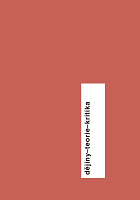Mezi trestáním nepřátel a výchovou pracujících osvojování sovětské právní kategorie chuliganstvo v Československu a v Německé demokratické republice (1956–1977)
Between Punishing Enemies and Educating Workers. Adoption of the Soviet Legal Category of khuliganstvo in Czechoslovakia and in the German Democratic Republic, 1956–1977
Author(s): Matěj KotalíkSubject(s): Political history, Social history, Political behavior, Post-War period (1950 - 1989), History of Communism
Published by: Univerzita Karlova v Praze - Fakulta humanitních studií
Keywords: cultural transfer; legal disciplination: socialism;
Summary/Abstract: This contribution presents a comparative study of adoption of the normative Soviet term khuliganstvo in Czechoslovakia and the GDR. Th e comparison uses a notion of intercultural transfer. Th e adoption of this normative concept and its application, which resulted in the Czechoslovak notion of výtržnictví (hooliganism) and East German notion of Rowdytum, is traced as creating a mixture of the Soviet infl uence and the local tradition. In part, this could be seen as due to the term’s evolution in its country of origin, since in the newly post-Stalinist Soviet Union, the meaning of khuliganstvo was being debated and re-assessed. In the GDR, moreover, immediately after 1956, the Polish infl uence that was dominant, later weakened and was replaced by the Soviet one. Soviet infl uence can be traced in the way ‘disrespect’, the main component of both legal norms, was treated. In both Czechoslovakia and the GDR, a more critical and independent approach prevailed, but awareness of the Soviet model inspired various amendments and suggestions, both implemented and not implemented, which aimed at improving dissatisfactory legal practice in the relevant country. In the light of empirical facts based on the transfer (Transfervergleich), we suggest a possible theoretical extension of the existing notion of intercultural transfer.
Journal: Dějiny - Teorie - Kritika
- Issue Year: 2015
- Issue No: 02
- Page Range: 220-252
- Page Count: 33
- Language: Czech

